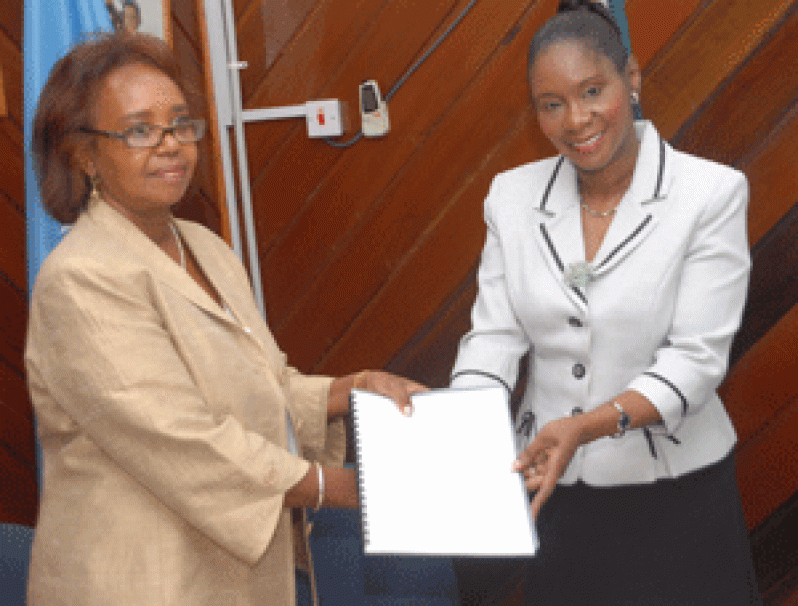THE Guyana Government yesterday signed a technical cooperation agreement with the United Nations Development Programme (UNDP) aimed at fighting trafficking in persons (TIP) in Guyana.  Human Services and Social Security Minister Jennifer Webster, in remarks made at the UNDP Office in Brickdam, where the agreement was signed, stated that the UNDP intervention to support the Ministry’s endeavour in the fight against TIP through funding is a most commendable one.
Human Services and Social Security Minister Jennifer Webster, in remarks made at the UNDP Office in Brickdam, where the agreement was signed, stated that the UNDP intervention to support the Ministry’s endeavour in the fight against TIP through funding is a most commendable one.
She said Guyana has recognised the need to eliminate TIP within its society, though this would be difficult to achieve. In this regard, she pledged continued cooperation with the UNDP to achieve a further significant reduction in incidents of this scourge.
Minister Webster opined that the Guyanese populace needed greater sensitization on the issue, and government recognises this.
“The agreement will further enhance the cooperation of our donor partners in enabling us to work together to come up with the strategies that will see us reducing incidents of trafficking, especially at the community level and the levels where persons are more vulnerable,” she declared.
The Minister believes that this cooperation will provide additional support to victims of trafficking, so that they can become equipped with knowledge, skills, materials, and finance to enable them to reintegrate into their communities. It will also serve as a conduit for communicating incidents of established human trafficking.
The Ministry of Human Services is tasked with providing support for victims and their dependent children and families, but Minister Webster believes that a person’s status should also be taken into account.
“We have a right to provide safe conditions and accommodation. We have to provide psychological support to the victims; medical assistance and legal assistance; education and training opportunities,” she added.
She underscored the importance of educating victims, since that would make them more knowledgeable, and therefore empowered to further promote the fight against trafficking in persons.
“We all must be our brother’s and sister’s keeper. We must all look out for each other… We must pay attention to what goes on in our communities and our surroundings, and it is important that we contact the relevant authorities and collaborate together.”
The government currently has a task force, chaired by the Ministry of Home Affairs, which meets on a quarterly basis.
Both the government and the UNDP are hoping that the agreement will strengthen public participation, trust and confidence with stakeholders; and promote greater awareness with regard to human trafficking.
Minister Webster admitted that whilst significant efforts have been put into stamping out human trafficking, a lot more still needs to be done.
Meanwhile, UNDP Resident Representative Khadija Meusa, in her address to the gathering, reaffirmed the UNDP commitment to working with Guyana to implement the project to support victims and their families who are affected by human trafficking.
“UNDP will collaborate with the Ministry in strengthening their capacity to respond to issues related to trafficking in persons in Guyana. TIP is a major concern for all stakeholders, not only in Guyana, but also around the world. Young women, particularly from the hinterland and coastal communities, are the most affected,” she disclosed.
She made reference to the UN Report on Guyana dated June 11 2011, which stated that Guyana is a source and destination country for women and children subject to sex trafficking and forced labour.
The report further states that government is making significant efforts to comply with minimum standards for the elimination of trafficking, and officials, including those from the mining sector, have been making efforts to rescue potential victims of TIP.
The project will focus on public awareness, training of focal points in administrative regions, and victim support; and will be implemented in collaboration with stakeholders, including those from mining companies, non-governmental organisations (NGOs) and communities.
“This is not only encouraging, but very necessary, because if those who are on the ground and participating in areas where there are victims (should) open their eyes and look around and see, every day (if they could) identify unusual situations where people are really slaves. Trafficking is today’s slavery,” Meusa pointed out.
Gov’t inks agreement with UNDP in fight against TIP
SHARE THIS ARTICLE :
Facebook
Twitter
WhatsApp



.jpg)








